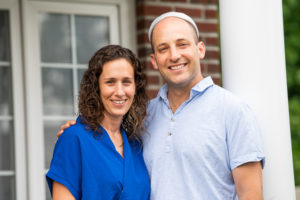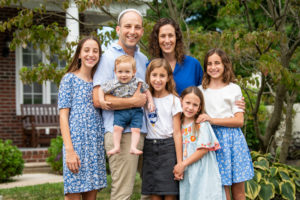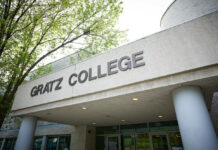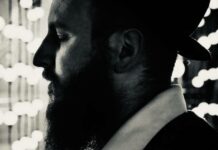
Benaya and Ayala Yehuda are coming to the Jack M. Barrack Hebrew Academy and the Perelman Jewish Day School, respectively, to teach students about Israel, to foster in them a stronger connection to the Jewish homeland and to continue building that bridge that helps solidify the Jewish Diaspora.
But while they will proselytize about the Jewish state, the Israelis may be even more excited to become Americans for a couple of years. They are hoping that, as they teach kids about Israel, those same students, as well as their neighbors and co-workers, will teach them about the Jews’ adopted home in the religious melting pot of the United States.
After all, the Yehudas are not just making a reverse aliyah to the land of opportunity to take one in the classrooms of local day schools. The husband and wife are bringing their five children, all between the ages of seven months and 12 years, with them as well.
Benaya Yehuda, 37, who spent 13 years in the education field in Israel, will be the upper school Jewish life coordinator at Barrack, teaching Hebrew and Jewish studies. Ayala Yehuda, 36, who also worked in the education field in Israel for about a decade, will serve as a classroom teacher in Perelman’s Ganon program, a Hebrew immersion setting for kindergarten-age students, meaning she will speak to them in Hebrew throughout the day.
The Israelis will teach at the Philadelphia-area schools, both in Montgomery County, for two years. Among their school-age children, two will attend Perelman and the other two will go to Barrack.
“We came for two years, and there’s a possibility of a little bit more,” Benaya Yehuda said. “It depends on how our children adjust. If all is good, we’ll be happy maybe to stay.”
An educator coming from Israel to the United States, or anywhere else in the Diaspora, to teach about Israel is called a shaliach in Hebrew, according to Barrack and Perelman officials. The schools are bringing the educators over through a World Zionist Organization program that aims to build stronger connections in the Diaspora. The organization is a non-governmental organization founded in 1897 at Theodor Herzl’s First Zionist Congress in Switzerland.
Both Barrack, which serves students in grades 6-12, and Perelman, which educates pre-K-5 students, already have extensive Israel study programs in history, culture and even the Hebrew language. So, their goal with a shaliach is not to add a program of study. It’s to deepen it.
As Rabbi Marshall Lesack, Barrack’s head of school, explained, his institution focuses on three core areas in Israel education: formal education in the classroom, experiential learning through eighth- and 11th-grade trips to Israel and relational education through exposure to a shaliach. Lesack believes that American educators simply can’t replicate the perspective of people who have lived in Israel.
“You get tied to a place and country through the relationships you develop with people from that place,” he said. “That’s why a shaliach is important.”
Rabbi Chaim Galfand, the school rabbi at Perelman, and Emily Cook, the principal of Perelman’s Stern Center in Wynnewood, echoed Lesack’s point about relational education. Galfand called a shaliach “an ambassadorial role.”
“It also just adds to the richness,” Cook said. “And then our students pass that on to their families, and it just builds on that love for Israel.”

Benaya Yehuda first became intrigued about this connection between Israel and the United States when he served in the Israeli Army with Michael Levin, the Philadelphia native who made aliyah in 2002, joined the army and died in combat in 2006. As Yehuda recalled, his relationship with Levin was the first time he understood the perspective of an American Jew who loved Israel.
But there was still so much more he wanted to learn.
“It was a mystery. How is that connection made? Half of the Jews in the world don’t live in Israel,” he said. “For me, it’s important to teach my family about Jews in America.”
Benaya Yehuda was perhaps interested in this connection because his parents had made aliyah from the U.S. And it was on a visit four years ago to his grandmother in Brooklyn that his wife, Ayala, became intrigued as well.
In more than 10 years of marriage, she had never met her husband’s American family. And, by the end of that trip, their eight-year-old daughter started speaking English.
“I was amazed to see that,” Ayala Yehuda said.
About two years after that trip, the pandemic showed the Yehudas that, if they wanted to see America, they couldn’t wait.
“So we started to live and do what we want. Not only dream,” Ayala Yehuda said. JE







So proud of you!
Dina